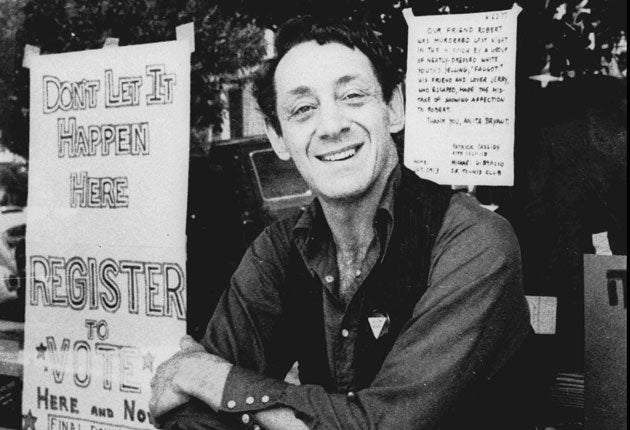Harvey Milk: US Navy ship to be named after lieutenant forced to resign for being gay
Milk became the first openly gay elected official in California's history and was a pioneer for LGBT+ rights

Your support helps us to tell the story
From reproductive rights to climate change to Big Tech, The Independent is on the ground when the story is developing. Whether it's investigating the financials of Elon Musk's pro-Trump PAC or producing our latest documentary, 'The A Word', which shines a light on the American women fighting for reproductive rights, we know how important it is to parse out the facts from the messaging.
At such a critical moment in US history, we need reporters on the ground. Your donation allows us to keep sending journalists to speak to both sides of the story.
The Independent is trusted by Americans across the entire political spectrum. And unlike many other quality news outlets, we choose not to lock Americans out of our reporting and analysis with paywalls. We believe quality journalism should be available to everyone, paid for by those who can afford it.
Your support makes all the difference.By the time Harvey Milk's supervisors in the US Navy officially questioned him about his sexuality, he had graduated from officer school and served as a diving officer on a submarine rescue ship during the Korean War.
Then his superiors caught him in a park that was popular with gay men, his nephew said. The sighting raised questions about Milk's sexual orientation in an era when the military banned gay, lesbian and bisexual service members. Milk was forced to resign.
In a move that signalled an about-face on the issue of gay rights, the Navy began to construct the USNS Harvey Milk on Friday, a fleet oiler that will provide fuel to ships and aircraft. The Navy announced in 2016 that Milk's name would appear on a ship, along with other civil rights leaders, including abolitionist Sojourner Truth and suffragist Lucy Stone.
Joining the Navy was a tradition in Milk's family. His Lithuanian-born father, William, and his mother, Minerva, both served, according to a biography on the website of the Harvey Milk Foundation. Milk studied maths and history at New York State College for Teachers, which is now the State University of New York, before he joined the Navy and started Officer Candidate School in Newport, Rhode Island.
Life after the Navy took Milk to New York, where he worked as a teacher, a stock analyst and a production associate for Broadway musicals. He moved to San Francisco in 1972 and opened a camera shop in the Castro District, which was known for its gay community.
Milk quickly became a powerful local activist. He founded the Castro Village Association for LGBT-led businesses, sat on San Francisco's Board of Permit Appeals and in 1978 was sworn in as a city-county supervisor.
In addition to advocating for policies that would affect all residents, Milk was also a fervent protector of gay rights. He joined others in opposing Proposition 6, a California ballot initiative that would have mandated firing gay teaches from public schools, The bill, sponsored by Republican state Senator John Briggs, was defeated.
Milk urged gay people to proclaim their sexual orientations as a way to fight for equality.
"We are coming out to fight the lies, the myths, the distortions," he said in a speech. "We are coming out to tell the truths about gays, for I am tired of the conspiracy of silence, so I'm going to talk about it. And I want you to talk about it. You must come out."
People regularly lobbed death threats at Milk, who created several iterations of his will in case he were to be assassinated. "If a bullet should enter my brain, let that bullet destroy every closet door," he said in one version.
Milk's prediction became reality on 27 November 1978, when former Supervisor Dan White entered city hall through a basement window, killed Mayor George Moscone and shot Milk several times. Moscone had decided days earlier not to reappoint White to the legislative body.
Dianne Feinstein, then a supervisor and now a Democratic senator from California, found Milk's body and told people who gathered at city hall that Moscone and Milk, then 48, had been killed. White pleaded "diminished capacity" at trial because he had fallen into a depression and, among other things, eaten a lot of sugar-heavy food before the killings.

Using that so-called "Twinkie defence," a jury found White guilty of voluntary manslaughter, instead of murder. Riots and candlelight vigils took place to express outrage at the verdict. White served five years in prison and later killed himself.
In contrast with White's suicide, which mostly went unnoticed by the public, Milk's legacy lives on.
It wasn't until more than a decade after his death that the Navy would have been barred from forcing Milk out for being gay. President Bill Clinton in 1993 signed a policy of "don't ask, don't tell," which banned harassment of "closeted" service members but still banned openly LGBT+ people from the armed forces. President Barack Obama repealed the policy in 2011, opening the door for LGBT+ military members to reveal their sexual orientations.
The San Francisco Board of Supervisors in 2012 urged the secretary of the Navy to name a ship after Milk, one of the nation's first openly gay elected officials. The answer to their request would come four years later.
"When Harvey Milk served in the military, he couldn't tell anyone who he truly was," Scott Wiener, then a San Francisco supervisor, wrote in 2016 when the Navy announced the ship's name. "Now our country is telling the men and women who serve, and the entire world, that we honour and support people for who they are."
Washington Post
Join our commenting forum
Join thought-provoking conversations, follow other Independent readers and see their replies
Comments